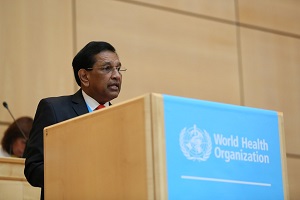
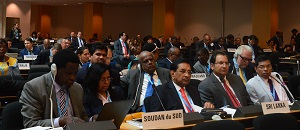
Minister of Health, Nutrition and Indigenous Medicine Dr Rajitha Senaratne on Tuesday (24 May 2016) drew the attention of the 69th World Health Assembly (WHA) meeting in Geneva to the recent floods and landslides in Sri Lanka that affected nearly half a million people and appreciated the expression of solidarity and support by countries, partners and the World Health Organization (WHO), to strengthen the timely health response to the affected people.
Addressing the Assembly under this years’ theme, “Transforming our World: the 2030 Agenda for Sustainable Development “, Minister Senaratne stated that “the Government of Sri Lanka is fully committed to the Sustainable Development Agenda and has already set up a multi sectoral Sustainable Development Secretariat to achieve this goal”. Drawing attention to the increasing influx of migration, Minister highlighted the need to pay attention to the health of migrants, irrespective of their status of migration. In this context, he recalled the offer made by the President of Sri Lanka to host the second Global Consultation on Health of Migrants in Sri Lanka October this year, and stated that Sri Lanka is envisaging a political declaration as the outcome of the Global Consultation to demonstrate the commitment to this important issue.
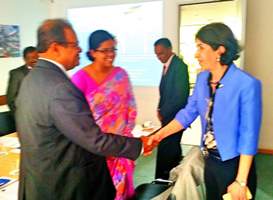
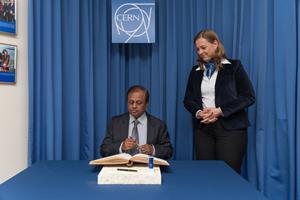
Minister of Science, Technology & Research, Susil Premajayantha who visited the European Organization for Nuclear Research (CERN) 10 May 2016, has agreed to enhance collaboration between CERN and Sri Lanka, through the development of a network of scientific community of Sri Lankan scientists and researchers, who could remain engaged with the research activity carried out by CERN - the most prominent particle physics research institute in the world which is best known for its flagship discovery of the ‘Higgs-Boson” in 2012. It has been suggested that a ‘network’ of scientists with an organizational structure could be formed within Sri Lanka, with one institute serving as the nucleus in collaborations with CERN. It was suggested that the suitable scientists to be members of such a ‘network’ can be identified with the help of CERN, through national science institutions such as the National Science Foundation (NSF) and Arthur C. Clarke Institute, 7 science faculties in Universities etc.
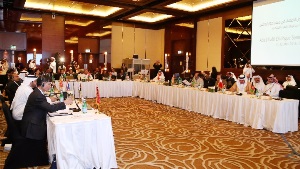
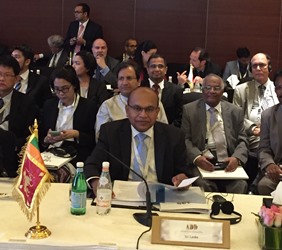
Sri Lanka has been unanimously elected to be the next Chair-in-Office of the 17 member ‘Abu Dhabi Dialogue’ (ADD) among Asian Countries of Labour Origin and Destination.
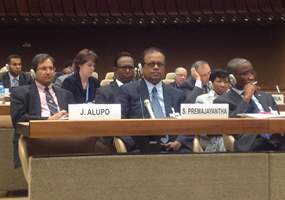
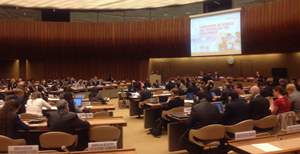
Minister of Science, Technology & Research of Sri Lanka, Susil Premajayantha said that there is a sense of urgency in Sri Lanka today over moving towards a knowledge based society. Underlining that Sri Lanka’s ability to facilitate a scientific culture that encourages innovative thinking will determine the country’s ability to effectively use knowledge for growth, he said emphasis has been laid on developing strong research and development culture and the methods of ensuring quality of research in the country.
Minister Premajayantha made the above observations at the 18th Annual Session of the United Nations Commission on Science and Technology for Development (CSTD) held from 9-13 May in Geneva, Switzerland, during the High Level Segment on ‘Implementing the post 2015 development agenda: moving from commitments to results.’
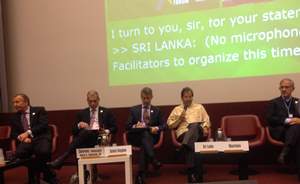

Sri Lanka's Permanent Representative to the UN in Geneva Ravinatha Aryasinha has said, by becoming a State party to the Budapest Cyber Crime Convention from 1st September 2015, Sri Lanka has demonstrated its strong commitment towards harmonizing national laws, improving investigative techniques, and increasing law enforcement and judicial cooperation among nations in combating cyber crimes.
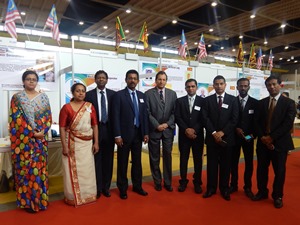
A team of 7 inventors led by Dr. Mahesh Edirisinghe, Commissioner of Sri Lanka Inventors Commission (SLIC) participated at the recently concluded 44th International Inventors Exhibition held from 13-17 April 2016 in Geneva. They have secured 2 Gold Medals with a special recognition from jury for one invention, 3 Silver Medals and 2 Bronze Medals.
Two inventors were fully sponsored by Sri Lanka Inventors Commission (SLIC), having been selected from among the Presidential Award Winners and Sahasak Nimavum Award winners while the other inventors have joined the Sri Lankan delegation on their own expenses.
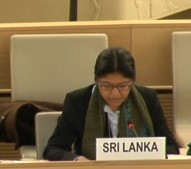
Sri Lanka said “Especially in the context of factually incorrect reference to Sri Lanka in the Report, we welcome the visit of the Special Rapporteur on Minority Issues to Sri Lanka, as such a visit will certainly enable the Special Rapporteur to engage with all concerned in my country to obtain the factual position in this regard and accurate information which will clarify and clear misconceptions pertaining to the areas mentioned in this report”.
Deputy Permanent Representative of Sri Lanka, Mrs. Samantha Jayasuriya made this intervention at the Interactive Dialogue with the Special Rapporteur on Minority Issues under Agenda Item 3 during the 31st Session of the Human Rights Council held at the Palais des Nations on 15 March 2016 in Geneva.
